Unveiling Fascinating Friends with Benefits Research from ZAVA

“Friends with benefits.” This is a term used to describe two people who have a sexual arrangement on the side of an otherwise platonic friendship.
How do these types of relationships start? Does being bed buddies get complicated? How do they end? And who really benefits from them?
Curious? We were too. So we surveyed 1,000 Europeans and Americans about the inner workings of being friends with benefits. Here’s what we learned.
The Flexibility of a Friendship
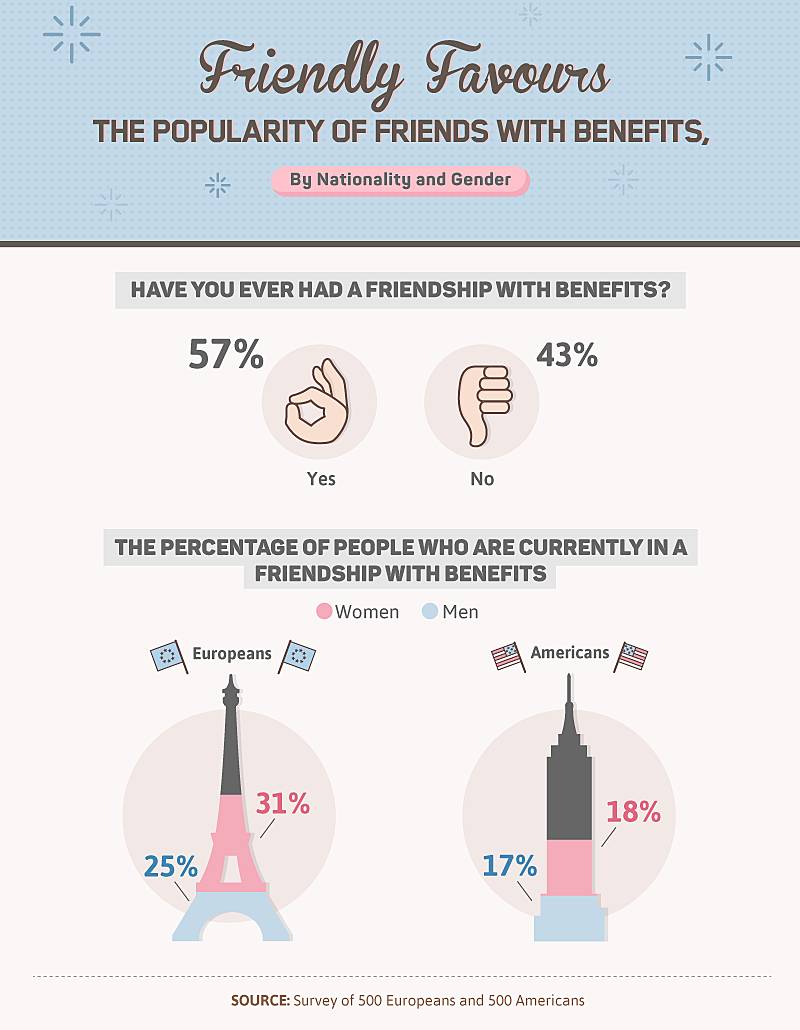
When we asked survey respondents if they’d ever had a friendship with benefits, more than half of Europeans and Americans said yes (57 percent). Perhaps this is because casual sex in America is on the rise, withover 80 percent of college students saying they’ve engaged in casual sex. Europeans are even more up for a casual fling, with three European cities making the list of the top 10 most sexually expressive cities in the world, compared to two U.S. cities.
So who’s currently in an FWB (friends with benefits) relationship? According to our survey, women were more likely than men to dive in.
Mutual Satisfaction
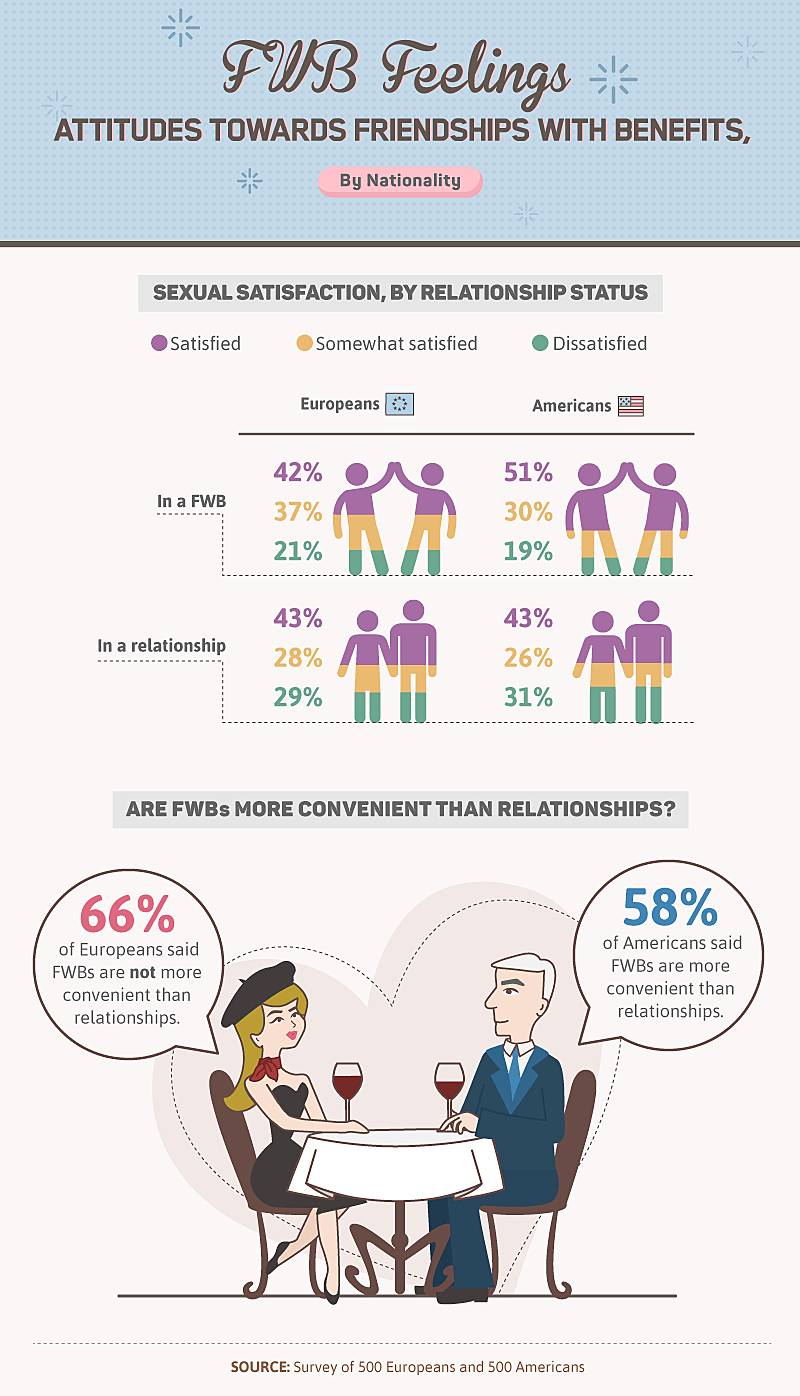
Are FWB relationships truly satisfying? And how do they stack up against committed relationships?
Over half of American men and women were sexually satisfied in a FWB relationship. In fact, Americans were far more likely to feel sexually satisfied in a no-strings-attached sexual friendship, with 51 percent reporting being completely satisfied, compared to 42 percent of Europeans who reported the same.
Conversely, Europeans in committed relationships were just slightly more satisfied compared to those in FWBs (43 percent versus 42 percent). However, sex in this type of relationship was more likely to be dissatisfying than a more casual encounter (29 percent versus 22 percent).
Only 34 percent of Europeans thought a friendship with benefits was more convenient than a relationship, compared to the 58 percent of Americans. Though convenience may be a factor in American satisfaction with FWBs, overall, almost a third of all respondents in relationships reported sexual dissatisfaction. This aligns with the fact that more people are reporting dissatisfaction in marriages. Specifically, Britain has reported a national decline in people’s sex drives, and increasing obesity may be complicating our sexual relationships.
Making the Best of a Casual Situation
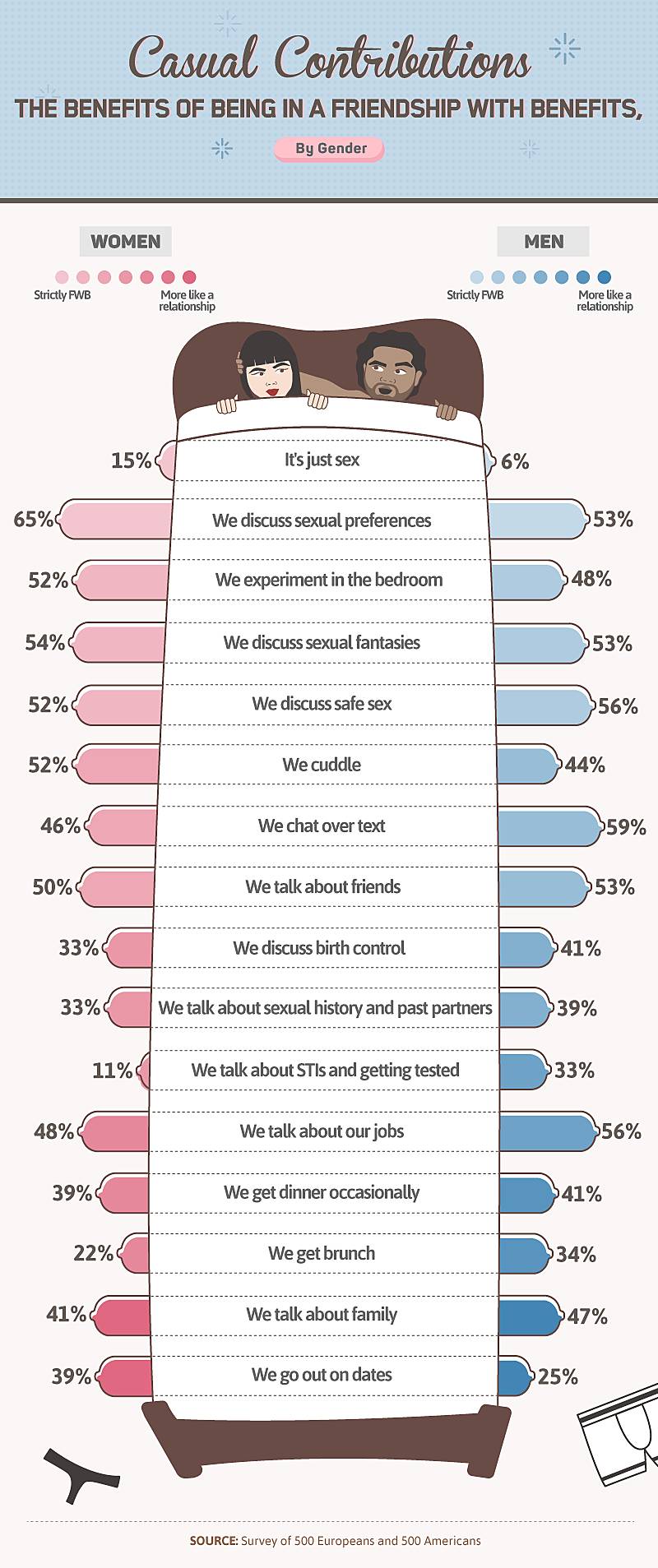
Plenty of people have friendships with benefits these days – but what does that really mean? Is it just sex, or is there more involved?
When we asked our survey participants, a large number said their bed buddy relationships were a place to experiment in the bedroom, explore sexual fantasies, talk about safe sex, and cuddle. Over 40% also talked about family, friends, and their jobs. And at least a quarter of respondents said they went out on dates or occasionally grabbed dinner.
Interestingly, women were more than twice as likely as men to say it was just about sex (a recent study found women like casual sex as much as men do), and men were more likely to talk about STIs and testing than their female counterparts.
Unraveling Emotional Attachment
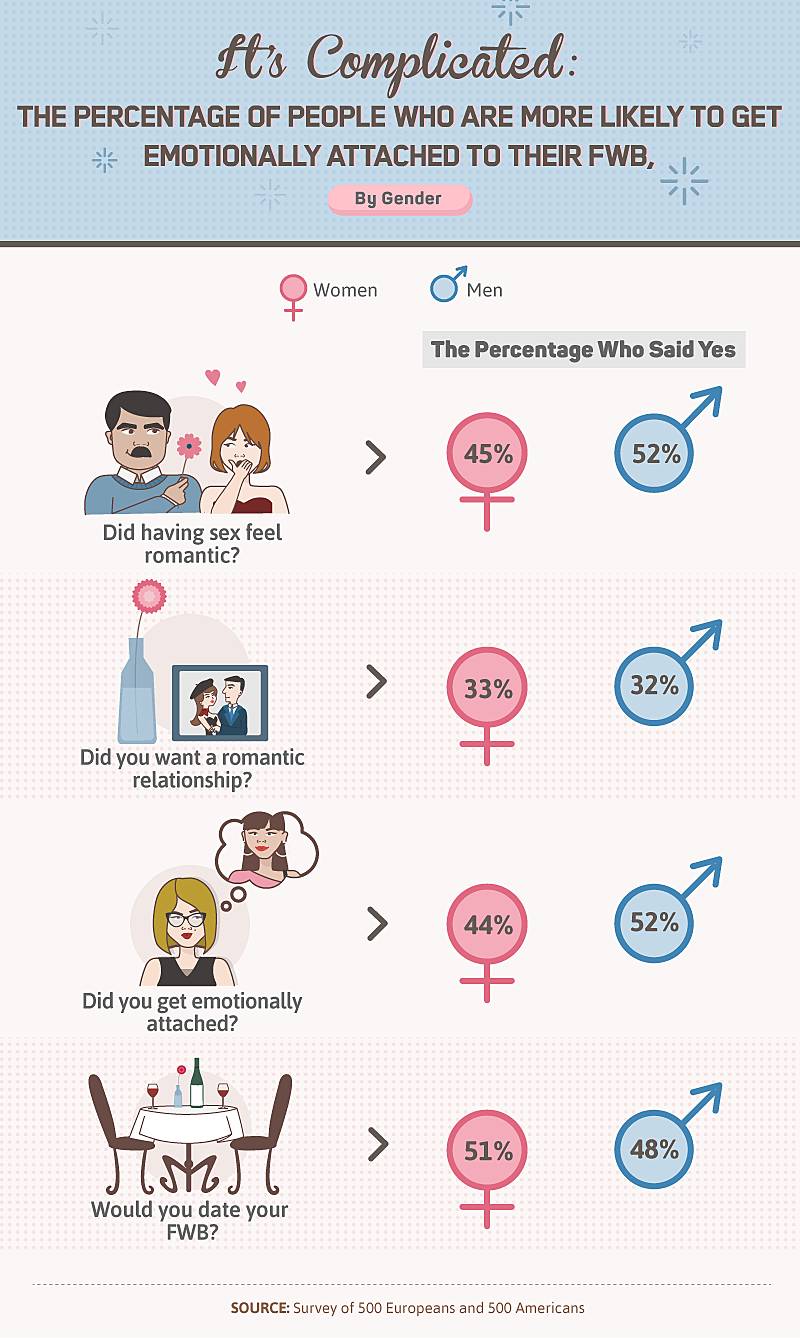
A friendship with benefits may seem like a no-strings-attached arrangement, but it can be a bit more complicated than that.
The men and women surveyed were somewhat split as to whether their FWB was truly just a means of having sex. So who was more likely to admit attachment and romantic feelings? Men were slightly more likely than women to be attached to their FWB (52% of men versus 44% of women).
And when asked if the sex felt romantic, 45% of women and 52% of men said yes again, despite only 33% of women and 32% of men going into the arrangement looking for a romantic relationship.
...And They Lived Happily Ever After (Maybe)
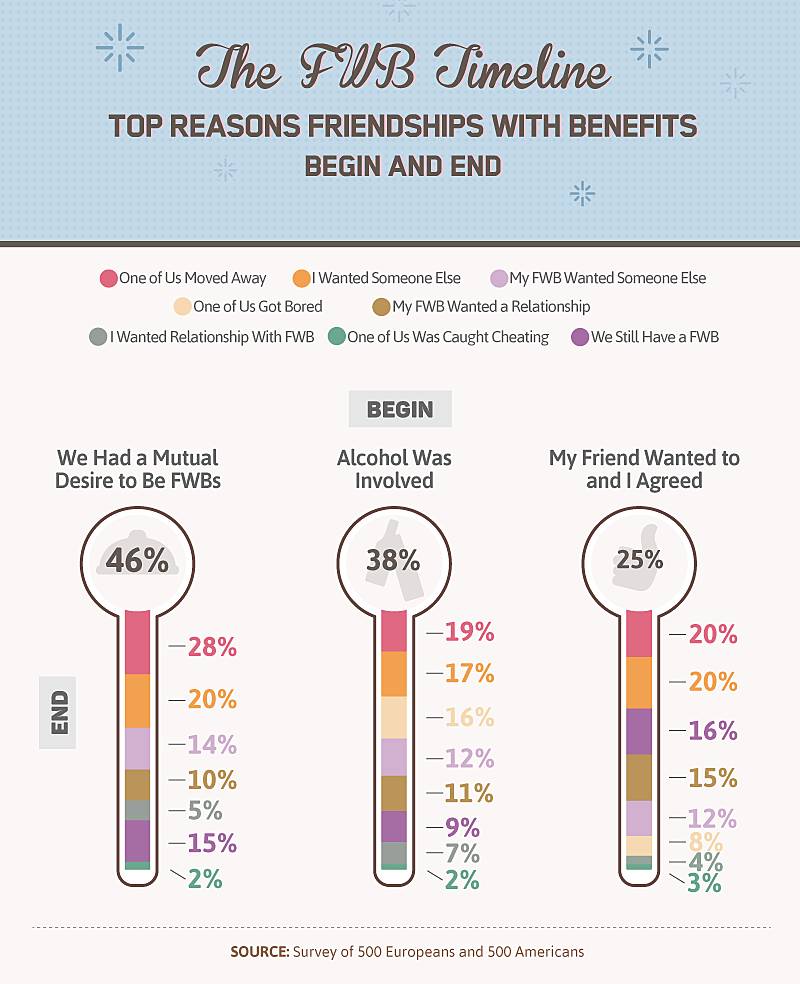
How does an FWB relationship begin – and how does one typically end? Survey says 46 percent of the time it all starts with a mutual desire to be FWBs. Alcohol was involved 38 percent of the time. And 25 percent of the time, an FWB began because one person had always wanted to try it, so they jumped at the chance.
The most common reason for ending an FWB, interestingly enough, was because one of the people involved moved away. And the secondary FWB killer? When one partner wanted a relationship with someone else.
Friends, Benefits and Sexual Satisfaction
With over 50 percent of Europeans and Americans saying they’ve had an FWB, casual sex seems to be the norm and not the exception (and with some research suggesting casual sex can make people happier, who could blame us?). But when it comes to FWB relationships, most of the old stereotypes appear to be dead. Women want sex as much, if not more, than men.
Whether you’re in an FWB, relationship, or are single and ready to mingle, we hope your sex life is a great and, of course, safe one. For your sexual health needs, ZAVA is here to help. Have complete peace of mind when you check out our confidential and easy-to-use website for more information.
Methodology
We surveyed 500 Europeans and 500 Americans about whether they’ve ever had a friendship with benefits, how it started, and how it ended. We asked respondents to rate their level of sexual satisfaction, emotional attachment, and what they considered the benefits of an FWB, while also asking about relationship satisfaction and basic demographic questions.
Fair Use Statement
Give something back to your readers by sharing our findings for noncommercial purposes. Just please make sure to link back to our study and give proper credit where it’s due.
Explore ZAVA services
| Service | Treatment | |
|---|---|---|
| Men's health | ||
| Women's Health | Microgynon, Cerelle pill, Cerazette, Yasmin pill, Lucette, Rigevidon, Cilique, Evra patch |
|
| General Health | ||
| Sexual Health | ||
Genital Chlamydia and Gonorrhoea Test, Oral Chlamydia and Gonorrhoea Test, Extended STI Test, Chlamydia Test, HIV Test, HPV Test |
||
| Chronic Health | ||
Atorvastatin, Simvastatin, Rosuvastatin, Cholesterol Test Kit |
||
| Travel Health | ||